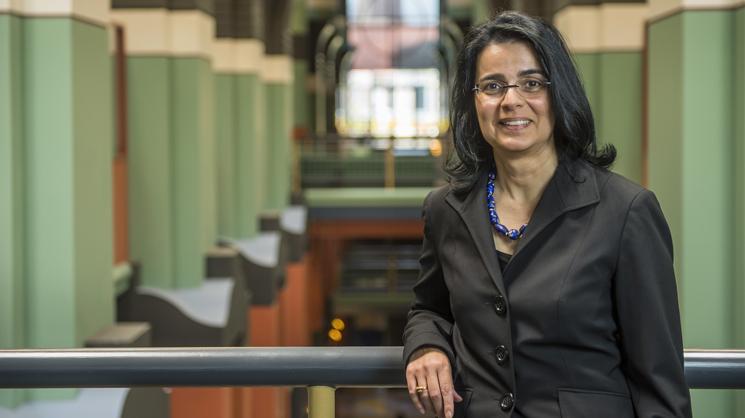Training more students and fellows to conduct research that has the potential to benefit personalized medicine and improve the understanding of health and disease has been made possible with funding from the National Library of Medicine (NLM).
The NLM Training Program (NLMTP) in Biomedical Informatics and Data Science was awarded a $3.1 million renewal following a competitive review process by the NLM. The multidisciplinary and multi-institutional grant will support seven predoctoral students and four postdoctoral fellows each year for five years.
The Gulf Coast Consortia (GCC) and its training arm, the Keck Center, manage the training program, which includes faculty from Rice, Baylor College of Medicine, University of Houston, the University of Texas Health Science Center at Houston, MD Anderson Cancer Center and the University of Texas Medical Branch at Galveston (UTMB). The NLMTP is the largest of five competitively funded training programs overseen by the Keck Center.
“We aspire to train a generation of scientists who are comfortable crossing traditional boundaries and who can find bold solutions to biomedical problems,” said Lydia Kavraki, principal investigator and program director of the NLMTP. She is the Noah Harding Professor of Computer Science, professor of bioengineering and professor of electrical and computer engineering.
Program trainees are selected through a competitive application process and are co-mentored by two faculty members with complementary expertise. Trainees and their dual mentors are drawn from across the six NLMTP institutions.
“This novel mentoring arrangement, in which a computational faculty member and a biomedical sciences faculty member or a clinical investigator jointly mentor a trainee, has been instrumental in the success of the NLMTP since its inception,” Kavraki said.
For the program’s sixth consecutive renewal, 40 core faculty have been assembled who collectively have more than $104 million in federal funding. The NLMTP faculty are currently mentoring 167 predoctoral students and 93 postdoctoral fellows.
“Our greatest strengths are our mentoring structure as well as our flexibility and willingness to help each trainee on an individual basis,” Kavraki said. “These combined with our strong academic programs, our extensive research activities, our well-equipped laboratories and our incredible faculty and students provide an unparalleled training environment.”
Building internationally pre-eminent graduate and Ph.D. programs and enhancing research achievement and reputation are goals of Rice’s Vision for the Second Century, part two.
The NLMTP has evolved over its 25 years. Initially the program was conceived as training in computational biology and was led by Tony Gorry, who was Rice’s Friedkin Chair in Management and professor of computer science. The new grant is focused on biomedical informatics and data science.
“Biomedical informatics broadly encompasses the design and implementation of novel methodologies and technologies to solve challenging problems across the entire spectrum of biology and medicine,” Kavraki said. “Our training program puts emphasis on quantitative methods and data science. I cannot imagine dealing with biomedical problems in the future without strong foundations in computer science, statistics and data science.”
The new NLMTP program will support research in translational bioinformatics, clinical informatics and clinical research informatics. Collectively these areas advance personalized medicine and connect data and knowledge to health and disease.
The program has had many successes in the last five years. Among recent trainees, Christine Peterson is currently an assistant professor at MD Anderson; Kevin Liu is an assistant professor of computer science and engineering at Michigan State University; Risa Myers is a lecturer in computer science at Rice University; and Raphael Rosengarten has started his own biomedical informatics company. Others are continuing their studies or have taken positions in academia or industry.
“I am most proud of our trainees,” Kavraki said. “They have assimilated and combined elements from our rich environment and their individual training and have produced truly exceptional work.”
The NLMTP trainees travel to the yearly NLM conference, where they have the opportunity to present their research. Over the last five years, they have consistently returned with multiple awards presented to them by their peers and the NLM leadership.
The training program also received a supplemental award for developing a graduate course on data science. The goal is to create a course that will teach data science principles with emphasis on the systems that are needed for the analysis of biomedical data.
“There is a growing need for investigators trained at the intersection of computer, statistical and information sciences with one or more biomedical application domains,” said B. Montgomery (Monte) Pettitt, the director of the Sealy Center for Structural Biology and Molecular Biophysics, the Robert A. Welch Distinguished Chair of Chemistry and professor of pharmacology and toxicology and of biochemistry and molecular biology at UTMB. Pettitt is also a founder of the Keck Center and a member of the steering committee of the NLMTP. “The NLMTP fills a critical need,” he said. “Our NLMTP is a proof of the strength of our combined community.”

